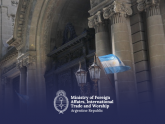The Argentine House of Representatives approved the World Trade Organisation (WTO) Agreement on Fisheries Subsidies. The Agreement, which required over 20 years of negotiation, represents one of the WTO’s main achievements since its creation. For the first time, it establishes restrictions on subsidies that negatively affect trade and conservation of fishery resources and prohibits subsidies that contribute to illegal, unreported and unregulated (IUU) fishing, fishing of overfished stocks and fishing on the unregulated high seas.
This Agreement has significant implications for the Argentine Republic, given its large maritime coastline and the importance of its fishery resources. In particular, it is expected to contribute to reducing fishing pressure in the area adjacent to the Argentine Exclusive Economic Zone, colloquially referred to as “mile 201”. By limiting the possibility for countries that resort to subsidies to artificially maintain the activity of their fishing fleets, the Agreement will contribute to the protection of fishery resources in the waters adjacent to national jurisdiction, constraint the capacities of large distant-waters fishing fleets and complement the patrolling efforts of national authorities in the field.
With the approval of the Argentine Congress, the Government will now be in a position to join the more than 80 countries that have deposited their instrument of acceptance with the WTO. The Agreement will enter into force upon acceptance of 110 WTO members.
In parallel, WTO members will continue negotiations to agree on “Additional Provisions on Fisheries Subsidies”, which mainly concern subsidies that contribute to overcapacity and overfishing. Once agreed, they will constitute –together with the Agreement– the comprehensive disciplines on fisheries subsidies, in accordance with Ministerial Decision of 17 June 2022 on the Fisheries Subsidies Agreement, paragraph 4.


